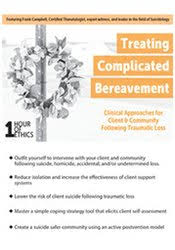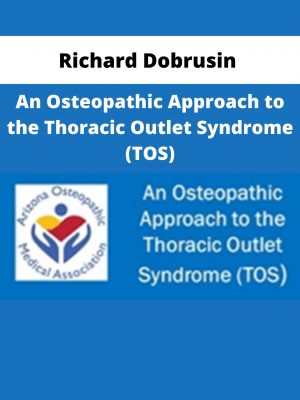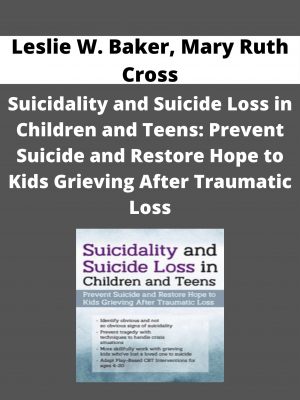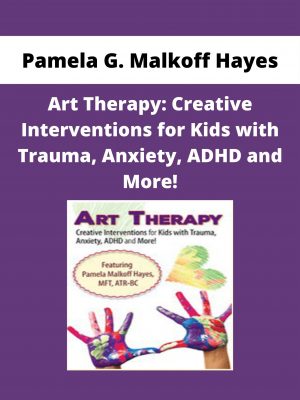Frank R. Campbell – Treating Complicated Bereavement
$219 Original price was: $219.$62Current price is: $62.
Shopping Instructions:
- DISCOUNT 15% : SHOP15
- Product Delivery: Within 1 – 12 hours after purchase.
Early in my career I met individuals and families who had experienced loss from profound and complicated causes of deaths including suicide, homicide, accidental and ambiguous losses.
Frank R. Campbell – Treating Complicated Bereavement
DEVELOPMENT AND RESOLUTION OF A CRISIS
- How Crisis Theory is a guide to understanding your client’s loss journey
- The self-defined nature of crisis development in the face of loss
- The ‘contributaries’ that facilitate complicated grief
- The role of maladaptive coping
- The role of alcohol and substance abuse (prescription and recreational)
- Risk factors for clients who are coping with complex causes of death and how to lower their risks
- Equipment to help the bereaved take charge of their Journey:
- Understand how their loss has unfolded into defining moments
- Steps that lead to Post-Traumatic Growth rather than pathological grief
- Identify thoughts of suicide and suicidal ambivalence and develop a plan to reduce risk
- Self-care exercises for clinician and client
PREPARING TO TREAT SUDDEN AND TRAUMATIC LOSS
- The most common type of sudden and traumatic loss faced by communities
- The impact of sudden and traumatic loss on:
- Children (including impact on child development)
- Families and the potential for long-term negative consequences
- Community
- Equipment to:
- Identify and assist those who need additional treatment
- Refer (available resources and evidence-based practices)
- Provide treatment and support initially and through life milestones
- Ethical conflicts that create a risk for countertransference
SUDDEN AND TRAUMATIC LOSS: TOOLS FOR HEALING
- How metaphors can
- Aid in the initial assessment of the client’s status
- Benefit the client and therapist in the treatment of traumatic loss
- Provide an understanding of the complexities of the traumatic loss and grief process
- Examples of metaphors used by clients
- Training clients to use metaphors activate their informal support system
- The Active Postvention Model
- History of the LOSS Team Concept
- Preparing your community to activate the LOSS Team model
- The role of the Loss Team first responders in the initial and overall treatment of traumatic loss
ELICITING COMMUNICATION WITH CORE FEELINGS TO SUPPORT CONGRUENCY
- The benefits of going back to the basics
- Why the language of grief requires congruent feelings to be expressed
- Psycho-Educational Intervention
- How substitution of thoughts has complicated clear communication between the bereaved and their informal caregivers.
- How clients can become more clear in communicating their needs
- Implementing psychoeducational interventions in your grief practice
- Equipment for:
- Overcoming obstacles to hearing the emotions below the content of a client’s grief communication
- Overcoming challenges to implementing strategies for clear communication
Would you like to receive Frank R. Campbell – Treating Complicated Bereavement ?
Description:
Journeying through the Canyon of Why
Early in my career I met individuals and families who had experienced loss from profound and complicated causes of deaths including suicide, homicide, accidental and ambiguous losses. Most of them had already tried to get help from one or more grief support resources in the community without success. As both a Certified Thanatologist and a Forensic Suicidologist, I was concerned for the lack of understanding these clients were experiencing.
I have spent the last thirty years befriending this grief process and learning the techniques that clients find helpful. Working with grief responses following both man-made and natural causes of death has equipped me to offer a pathway for others to more effectively help the newly bereaved recover quicker.
In this recording, I will share what has helped clients, both in the United States and internationally to heal from that universal experience we refer to as sudden and traumatic loss. I will help you fill your therapeutic backpack with essential clinical strategies you can implement that will guide you and your clients safely through the journey of complicated grief.
Related products
HEALTH & MEDICAL
HEALTH & MEDICAL
HEALTH & MEDICAL
HEALTH & MEDICAL
HEALTH & MEDICAL
HEALTH & MEDICAL












